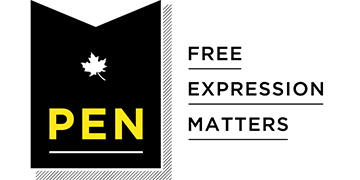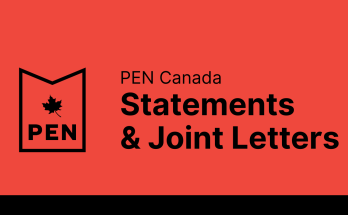Toronto, June 15, 2018 – Last night at PEN Canada’s annual general meeting former PEN International president and PEN Canada member and patron, John Ralston Saul, presented APTN reporter Justin Brake with the 2018 PEN Canada Ken Filkow Award for his work in advancing freedom of expression in Canada.
Selected from several outstanding candidates, it was Brake’s reporting from the Indigenous-led occupation of the Muskrat Falls hydroelectric project site in October 2016, from which he now faces civil and criminal charges, that led the jury in their selection.
Jury member John Ralston Saul shared a few words about Brake, the Charter and the state of free epression in Canada:
Justin Brake’s situation involves the most fundamental rules of freedom of expression. He is being threatened separately by a rich corporation and by the state.
For doing his job as a reporter, the corporation and the state are essentially charging him with trespassing in such a way that he could be both bankrupted and jailed.
The fact that this case involves an isolated site and Indigenous peoples – Muskrat Falls and the Innu and Inuit – takes us back to the worst of the old Canada in which state and corporations effectively collaborated with each other in order to sideline Indigenous rights and wishes. Justin Brake’s coverage ensured that this old style attempt at maintaining a silence around questionable actions was not entirely successful. The corporation and the state are attempting to punish him for this.
On the civil case side this is a serious reminder of how money can be used to “chill” freedom of expression. If the corporation succeeds or costs the journalist large amounts of money, the message is clear to all other journalists: Do not cover such situations in a determined way; be very careful not to annoy the corporation to such an extent that they sue you.
On the side of the criminal charges, this is the sort of thing you see in authoritarian or corrupt states in which the law is used to protect private corporate interests against public knowledge and the public interest. In my six years as the President of PEN International, traveling around the world from one frightening dictatorship to another, I was constantly faced by so-called legal attacks on journalists which resemble the attacks by the legal system of Newfoundland and Labrador on Justin Brake. That a Newfoundland and Labrador Supreme Court Justice would include in his ruling that Brake’s status as a journalist was not a material factor in the case, is deeply worrying. In fact, I find it astonishing that he could have written this. It contradicts both the Charter and the history of freedom of expression in Canada going back to Joseph Howe’s famous defense of free expression in the Nova Scotia court on March 2nd, 1835.
That Nalcor Energy would intentionally include Mr. Brake’s name in the list of those to be charged, even though they seem to have known that he was a journalist covering the demonstration, appears to be deeply cynical. The reporting on this situation which I have been able to read suggests that this action by the corporation is unprecedented. Normally, everyone, including corporations, understands that the role of journalists is to cover events and that they are not to be treated from a legal point of view as participants in the event. Think of the precedent involved here. If this is allowed to stand, writers of every sort could be at risk on a wide range of issues.
In both cases, the attempt to silence Justin Brake is an attempt to silence freedom of expression.
Just to reaffirm what I wrote two paragraphs ago, here is a quote from the Globe and Mail: “He is thought to be the only journalist ever to have been charged both civilly and criminally for reporting on a matter of public interest in this country.” This is a direct attack on freedom of expression in Canada and a direct challenge to the Charter.
Mr. Brake showed great courage in staying with the story as it unfolded on the ground. He is showing great courage in fighting against these charges, which are designed to destroy him personally and to frighten other journalists away from fully covering the story.
Mr. Brake’s case is an urgent and dangerous expression of the intent of this prize and of PEN’s very reason for existence.



